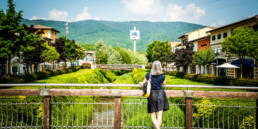I work at The Florentine, where we do a lot of translations from Italian to English. Over the years, we’ve become quite the specialists in translations for the tourism industry, including texts about food, wine, places to visit, spas and the like. Personally, I’m not a born translator, and try to avoid this job whenever possible. On the other hand, our editor, Helen Farrell, is a court-registered translator who lives and breathes words and their conversions. She actually has big dictionaries on her desk, and not only does she use them, she has been involved in editing one of the most important dictionaries in Italy!
This month at the Italy Blogging Roundtable we’re talking about impossible translations, or untranslatable words. In our office, we frequently laugh about the language of tourism descriptions and press releases, with its funny phrases that are almost impossible to translate. There is a whole alphabet of frequently used words and sentences in Italian, the correct interpretation of which are the mark of the truly professional translator. I’ve asked my colleagues to help me collate this alphabet.

A: Addetto
Probably the epitome of political correctness in Italy, an addetto alla pulizia is a glorified term for your cleaning lady (see also responsabile, below). You can also be a non addetto, i.e. unauthorized person. N.B. Never translate addetto as addict.
B: Bando
Plural, bandi. Correctly translated as “public tender”, this exquisitely Italian concept of competition for the assignment of a contract involves writing an extended proposal or even completing a job on spec, hoping to win the money associated with it. Not to be confused with concorso, which is when you personally apply for a job in the public sector.
C: Complemento/i d’arredo
If you’ve ever flipped through an IKEA catalogue, looked for the sections in a furniture store, or browsed home design online, you’ve found this category of objects that falls outside that of furniture: the complemento d’arredo. How to translate it? Try “home accessories”.
D: Doccia emozionale
Commonly found in descriptions of spa facilities, this one cracks us up. The “emotional shower” is truly impossible to translate. Renditions of Whitney Houston’s So Emotional spring (excuse the aqueous pun) to mind.
E: Emozione
Speaking of emotions, everything from a shower to an art exhibit is liable to involve the word emozione in Italian. Most of the time, we Anglos can simply remove the emotion, both from text and experience itself. If faced with translating “un emozionante esperienza tra natura e storia” you might replace emotion with any of the above: fascinating, amazing, beautiful, interesting. Or just delete the sentence.
F: Furbo
“Ma quella ragazza è proprio furba!” is half compliment, half criticism. She’s devious, she’s sneaky, but you have to hand it to her, buy, that girl knows how to obtain results.
G: orario Garantito
A two-word phrase that any self-respecting Italian commuter is familiar with. It’s a Friday, there’s a nationwide transport strike, but – do not worry! – because some trains will always be running at certain times and it’s guaranteed that you’ll be able to find a train home. The literal translation is “guaranteed hours” so to correctly translate this, we need to explain the concept the long way.
H: Herpes
It’s quite common for people to gesture to their mouths and not kiss you twice while apologizing that they have herpes, especially in the wintertime. If it’s on your lip, it’s a cold sore, not a venereal disease.
I: Immerso nel verde
This is a long-running joke about the style of tourism writing in Italian. Almost every hotel or bed and breakfast outside of a city center will be defined as immerso nel verde, literally immersed in green. To translate this, you’ll have to find out what green we’re talking about: a park, a forest… Then we can say that the hotel is located at the center of a large park, or at the edge of an enchanted forest, or simply that it has a garden.

J: Jolly
The letter J barely exists in the Italian alphabet, so when you have to phonetically spell a word with a J in it, you say Jolly (not Jello, with which Italians are not familiar!). The Jolly is a card in a deck (the Joker) but also is used in sentences referring to the usually exchangeable role of a person. Happiness has nothing to do with it.
K: Kermesse
A favourite of press offices, the kermesse refers to a calendar or line-up of events. Often these extend over a long period of time, with not entirely clear start and end dates.
L: Luminoso
Preferred lingo in apartment rental ads, in English, rooms are not luminous; they are well-lit, airy or spacious.
M: Musealizzazione
This Italian word is not even in the dictionary (we checked). Musealizzazione, whose literal meaning is “to make into a museum space,” calls for creative translation. Think outside the museum.
N: A Norma
If you’re buying a house, you may be comforted reading that the wiring is a norma. That is, it is “up to code,” not just that it’s normal.
O: Ospite d’eccezione
Every kermesse (see above) we translate seems to host an ospite d’eccezione, usually someone you’ve never heard of. The best way to translate this is not an “exceptional guest” but a “special guest”.
P: Prodotto Tipico
The “typical product” is the bane of all tourism translation, and all regions have so many of them! The best way to translate this is “local product” or “local specialty”.
Q: Questione
Possible translations: question, matter, issue, problem, point, argument, dispute, quarrel. Context is everything: the linguist lives in eternal hope of receiving reference material.
R: Responsabile
In job titles, everyone seems to be “responsible” for something. Responsabile della sicurezza, responsabile ufficio tecnico, io sono responsabile del social media di The Florentine… While in English it’s nice to know that you’re a responsible person, the correct translation of the job title will vary depending on what we’re dealing with. When in doubt, “head of” or “in charge of” usually does the trick, but it’s a descriptive rather than literal solution.
S: Sprezzatura
Thankfully not in common use any more, the word sprezzatura was used by Castiglione in his book The Courtier and is often cited as an untranslatable word (you didn’t think I could write a whole article without mentioning the Renaissance, right?). This refers to a man (a courtier) who does everything with calculated ease. Nowadays we would just say that he is “so cool”.
T: Tradizione e Innovazione
If you’ve ever read a description, in Italian, of any restaurant worth its salt, it will define itself as being “fra tradizione e innovazione,” meaning literally “between tradition and innovation,” i.e. we have updated our recipes to encounter modern tastes, but don’t worry, it’s still the same Italian food you expect. It’s a cautious phrase that embodies so much more than just language (see my review of John Hooper’s book, in which he talks about the fear of innovation in food). How should we translate this sentence? It’s not terrible to do so literally, but you might shake it up by extending it, something like “mixes traditional recipes with modern concepts” or “follows tradition while developing new methods and flavours.”
U: Urban Trekking
At least once a year, most regions hold an urban trekking festival. Italians don’t go hiking, they go trekking, and sometimes they do this in city centers, hence urban trekking, which they think is already translated into English. We are at a loss and have opted not to tell them this is not actually English.

V: Valorizzazione
Often incorrectly translated as “valorization”, this word is used frequently in descriptions of improvement or restoration of monuments, parts of cities, parks, etc. You also find it in the title of bandi (see above). In most cases, we can use the words improvement or enhancement, and sometimes promotion, though the translator must evaluate if the word is necessary at all in the sentence at hand.
W: Water
Potentially ripe with embarrassment. In Italian, “il vater” is short for water closet. If an Italian walks into a bar in desperate need of a water, here’s a tip: do not hand him/her a glass.
X: giorno X
Referring to the most important day for whatever (giving birth, going online…), we translate that as D-day, not X-day.

Y: “Y come yacht”
Like J, there are not many Y’s in Italian. Basically, just yogurt and yacht, making spelling my last name (Korey) out on the phone a real challenge. That’s why we at The Florentine made a video about learning the phonetic alphabet in Italian.
Z: Zapping
At the end of a long day translating, is there anything more annoying than your other half sitting on the sofa and indulging in zapping? By which, we mean “channel hopping.” Oh, the joy of false Anglicisms…
This article in The Florentine
A version of this article was subsequently published in The Florentine 208, March 2015, in paper only. Subscribe to TF at http://theflr.net/pdfsub

What are the funniest sentences you’ve come across in Italian? Can you suggest better translations for any of these? Let us know in the comments.
If you require truly professional translation services, contact Helen at The Florentine: redazione (@) theflorentine.net
Italy Blogging Roundtable
The Italy Blogging Roundtable is back this year after a long haitus, and February’s topic is “untranslatable words”. Your familiar crew of female knights is also happy to welcome a seasoned knight to the group, Michelle from Bleeding Espresso. So take a look at the other blog posts on this inspiring topic, I’m sure you’ll have a good laugh.
- Jessica – False Friends & A False Sense of Security
- Gloria – Senza parole…
- Rebecca – Lost in Translation
- Michelle – Lost in Translation: Adventures in Sola-tude
- Kate – Things my Sicilian Boyfriend and I fight about
- Melanie – Lost in Translation: Ancient Stories in Art
Sign up to receive future blog posts by email
Alexandra Korey
Alexandra Korey aka @arttrav on social media, is a Florence-based writer and digital consultant. Her blog, ArtTrav has been online since 2004.
Related Posts
December 31, 2023
How sewing saved my sabbatical
April 30, 2022




